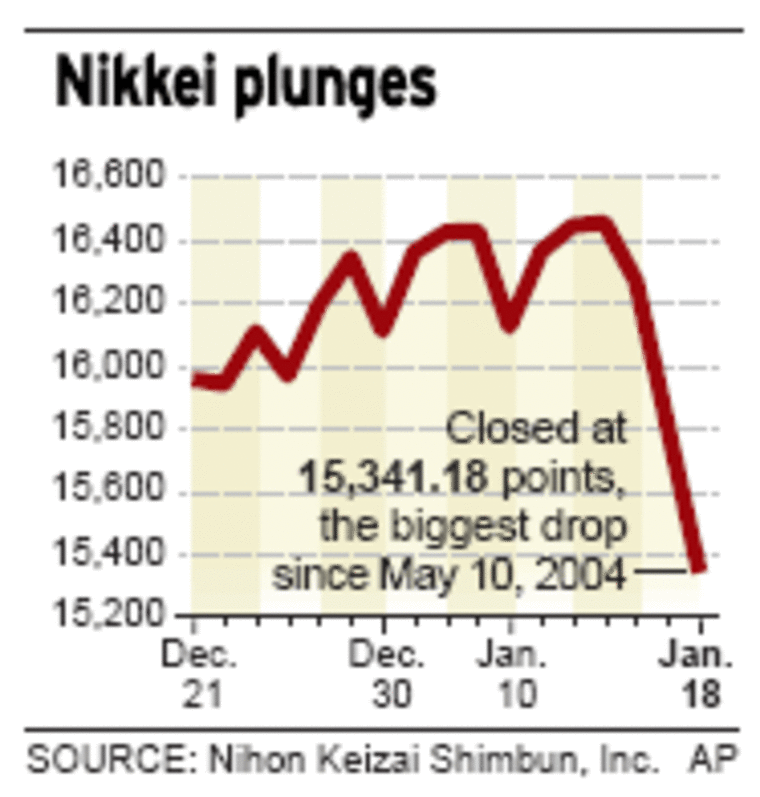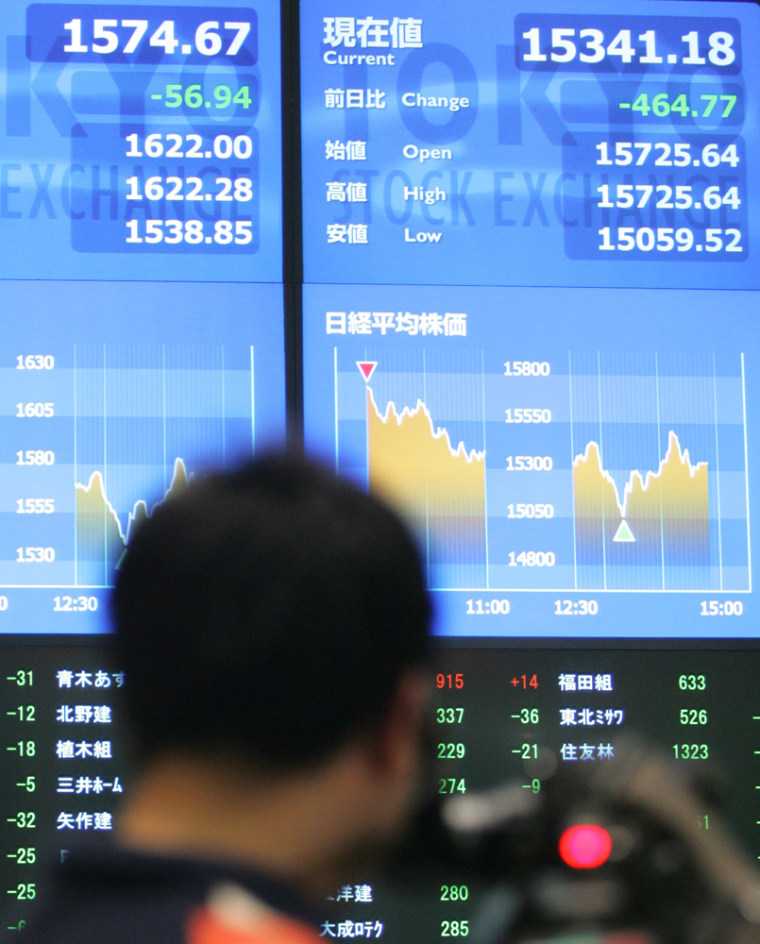Japan’s main stock market nose-dived for a second day Wednesday, as a stampede of sell orders forced the shut-down of the world’s second-biggest stock exchange, as investors were spooked by fall-out from a widening investigation into Internet company Livedoor.
The benchmark for the Tokyo Stock Exchange plunged 2.9 percent Wednesday in a session that had to be shortened by 20 minutes because of a surge in transactions — the first time it has ended early because it could not handle trading volume.
The Nikkei 225 index dropped 464.77 points to close at 15,341.18 points, its biggest one-day drop since May 10, 2004.
The sell-off in Tokyo weighed on European stocks, but did not weigh very heavily on the U.S. stock market. U.S. stock futures fell sharply early Wednesday morning, indicating a drop at the start of trading, but when the U.S. market opened only the technology sector saw a steep drop, reacting to worse-than-expected results from high-tech bellwethers Intel and Yahoo.
In Tokyo Wednesday, share prices extended losses from Tuesday, when the Nikkei fell 2.8 percent, following Japanese newspaper reports that the investigation that had started Monday was expanding. The index has fallen nearly 6 percent the last two days.
“Individual and foreign investors are selling in a panic,” said Satoru Otsuka, senior economist at Mizuho Research Institute in Tokyo. “The problem is that we have no idea how the Livedoor problem will unfold.”
Investors and the Japanese public alike were stunned when prosecutors marched into the Tokyo headquarters of Livedoor Monday evening on suspicion of violation of securities laws by giving false information.
Livedoor is headed by 33-year-old Takafumi Horie, who has risen to celebrity status as a geeky entrepreneur — a rarity in Japan. He has made unsuccessful attempts to buy a media conglomerate and a baseball team and frequently appears on TV.
Report: Livedoor concealed 1 billion yen
The national daily Yomiuri Shimbun reported that Livedoor is suspected of concealing a 1 billion yen ($8.7 million) deficit for the full-year results ending September 2004.
Horie denies any wrongdoing, and authorities would not comment on the Yomiuri report.
The Japanese media have dubbed the whole affair “Livedoor shock,” which has garnered banner headlines and intense news coverage the last two days.

Internet-related stocks like Softbank Corp. and Yahoo! Japan got hit in the market’s plunge, but blue-chip electronics firms like Canon Inc., Toshiba Corp. and Sony Corp. also fell.
Those losses could also be partly attributed to investor disappointment over to earnings results Tuesday from U.S. chipmaker Intel Corp. and Web giant Yahoo Inc., which were lower than analysts’ expectations.
Also, some investors used the probe as an excuse to sell stocks after the market had gained 40 percent last year amid signs of a long-awaited economic recovery here.
Dealing an extra blow was the unusual warning from the Tokyo Stock Exchange about halting trading as it got flooded with orders and was unable to process them, said Seiichi Miura, investment strategist at Mitsubishi UFJ Securities Co.
Once it became clear the market was selling off for a second day, investors seemed to panic and rushed to sell before the session ended.
“The cause was threefold — Livedoor, America and a mess-up by the Tokyo Stock Exchange,” Miura said. “People got worried about what’s going to happen tomorrow if we can’t sell today.”
Trading halted 20 minutes early
Earlier Wednesday, the Tokyo exchange had issued a warning it would stop trading if the system capacity limit of 4 million transactions was reached. As it reached 3.5 million about an hour before the session’s close, it announced it would stop trading 20 minutes early.
Trading volume, which is a higher measure because each transaction typically involves many shares, was 3.28 billion on the first section Wednesday, up from 2.465 billion on Tuesday.
The Tokyo exchange plans to delay the start of afternoon trading 30 minutes on Thursday, in anticipation of increased trading volume, Kyodo News Agency reported. The afternoon session is scheduled to begin at 1 p.m. local time (0400 GMT), Kyodo said.
“We plan to restart the exchange as normal and will keep a close watch on how trading develops,” Exchange President Taizo Nishimuro told reporters. “Our goal is to handle things in a way that won’t invite confusion to the market.”
Livedoor’s shares were briefly suspended during morning trading and closed unchanged at 596 ($5.18), after falling 14.4 percent Tuesday.
The market sell-off and the early close of trading could put a big damper on investor enthusiasm for Japanese stocks.
Confidence in the Tokyo exchange, the world’s second biggest bourse, had already been damaged by a system crash from a computer malfunction Nov. 1, when trade was suspended for all but the final 90 minutes.
Economics Minister Kaoru Yosano demanded a report from the exchange on its decision to shorten trading.
The aftermath of the Livedoor probe has been greater than what may be expected because of the wide attention its vivacious chief executive Horie has enjoyed in the last couple of years from the Japanese public as a pioneer in new-style management that challenged stodgy tradition.
Geeky entrepreneurs sporting T-shirts and jeans are rare in Japan, and Horie and his defiant mannerisms and glamorous lifestyle fascinated people here.
As a high-profile issue among ventures, Livedoor was popular among individual investors, and a plunge in its stock was apt to influence other shares because some people used Livedoor stock as security on loans to buy other technology stock, Miura said.
